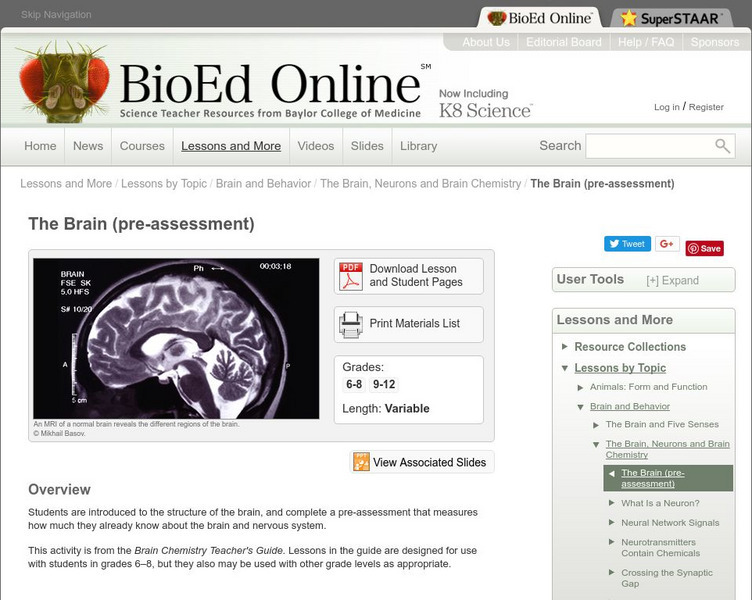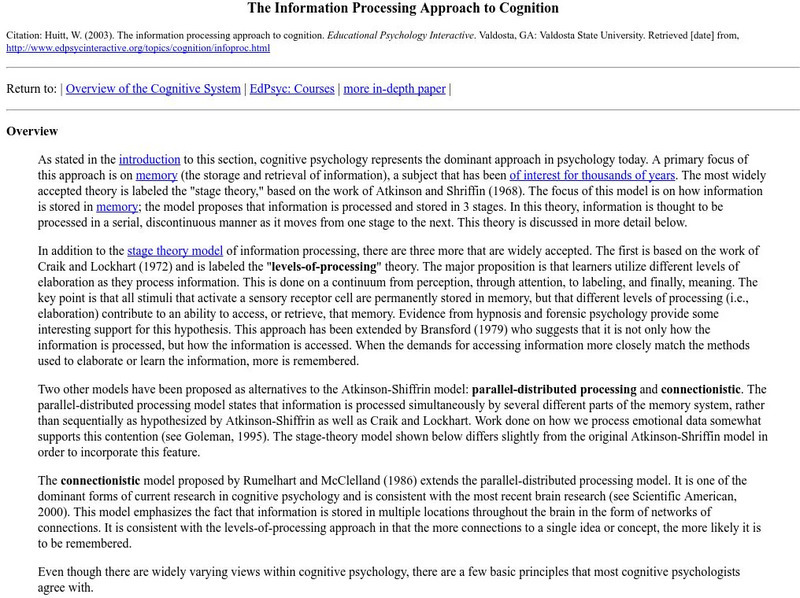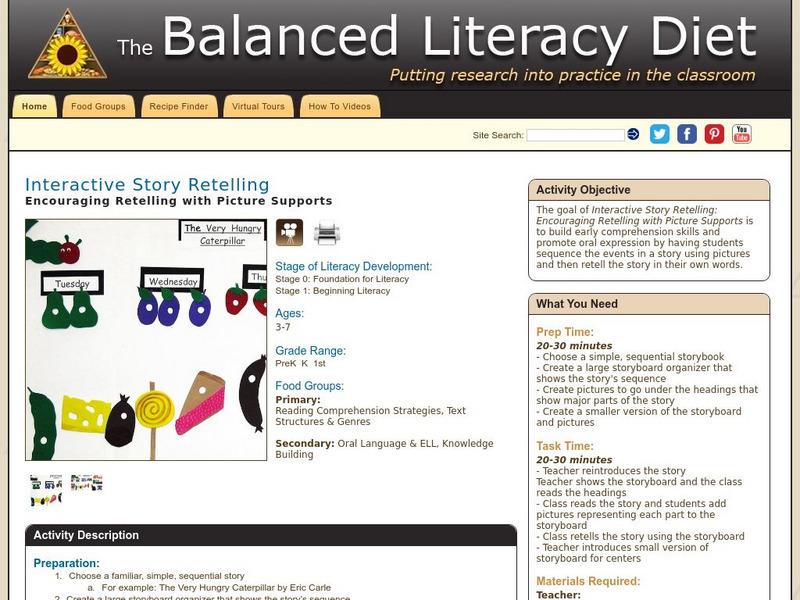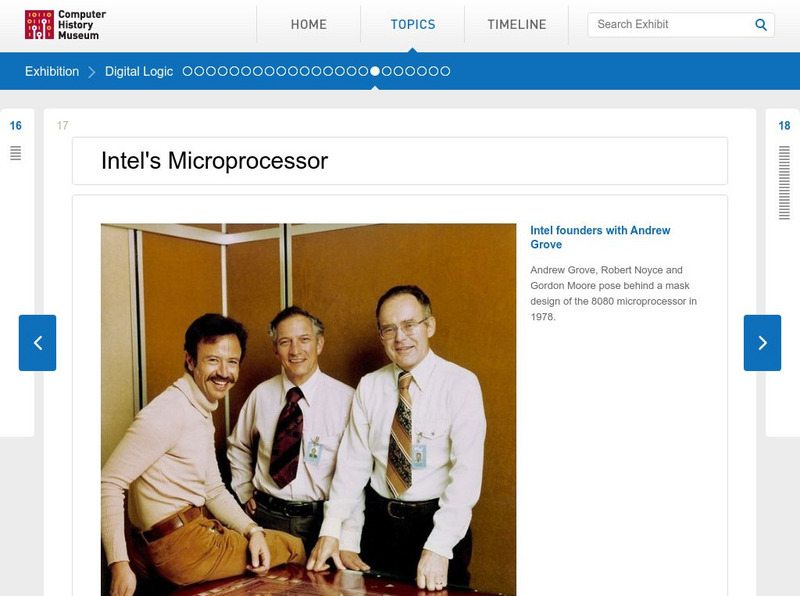BioEd Online
Bio Ed Online: The Brain: Pre Assessment
The brain has unique physical characteristics and it is specialized into many different areas, each with a different job. Brain functions and abilities develop over time. Assess student's knowledge of the structure of the brain by having...
Other
Educational Psychology Interactive:information Processing Approach to Cognition
Discusses the different models of information processing and the basic principles accepted in cognitive psychology. Outlines the different types of memory, and the principles of concept formation. Also provides a table listing examples...
ReadWriteThink
Read Write Think: Discovering Memory Li Young Lee's Poem "Memonic" and the Brain
Contains plans for eight cross-curricular lessons that teach about memory and the brain using Li-Young Lee's poem "Mnemonic." In addition to objectives and standards, this instructional plan contains links to PDF handouts and sites used...
BBC
Bbc: Scotland: Brainsmart
Beginners guide to how the human brain works and suggestions for taking care of it, memorizing numbers, remembering names, managing stress, and more. Take a trip inside and see what happens when it learns something new.
The Balanced Literacy Diet
The Balanced Literacy Diet: Interactive Story Retelling
The goal of Interactive Story Retelling: Encouraging Retelling with Picture Supports is to build early comprehension skills and promote oral expression by having students sequence the events in a story using pictures and then retell the...
PBS
Pbs Learning Media: Grover's Winter Games
A great game for number recognition, patterns, and working memory. Grover leads the way as you compete in ice skating, snowboarding, and skiing while learning along the way!
PBS
Pbs Learning Media: Memory Lane Fitness Lesson Plan
With this lesson, young scholars get a brain and body workout! Students work in pairs as the teacher calls out physical tasks such as high fives and tunnel tens. As the teacher is calling out these partner exercises, young scholars must...
PBS
Pbs Learning Media: Pre K 12 Resources for New School Routines: Creative Problem Solving Bingo: Pre K and K
These weekly activities are cross-curricular but emphasize Social-Emotional Learning, Math, and Literacy development. This week (January 4th), we are working on problem-solving.m
Computer History Museum
Computer History Museum: Core Memory
Brief description of Core Memory, a reliable high-speed storage device developed during the 1950s. The various memory artifacts are on display at the Computer History Museum. This site provides a glimpse into the development of the...
Computer History Museum
Computer History Museum: Delay Line Memory
Brief description of Delay Line Memory, a slower serial based design. This site provides a glimpse into the development of the information age from their large collection warehoused in the Computer History Museum located in Mountain...
Computer History Museum
Computer History Museum: Williams Tube Memory
Brief description of Williams Tube Memory, the first randam-access memory used by many first generation computers. The various memory artifacts are on display at the Computer History Museum. This site provides a glimpse into the...
Exploratorium
Exploratorium: The Memory Exhibition
Students investigate the Memory exhibition that was at the Exploratorium. Some topics examined are the anatomy of memory, Nagasaki, and Franco Magnani. The resource consists of exhibition news, online exhibits, articles, and lectures.
Massachusetts Institute of Technology
Mit: Open Course Ware: Courses: Brain Cognitive Science: Cognitive Neuroscience
College-level online neuroscience course focusing on human memories. Course highlights how memories are created and controlled, and how we are able to remember the past. Course features include readings and related resources on the topic.
Computer History Museum
Computer History Museum: I Cs, Microprocessors, & Memory
Brief description of ICs, Microprocessors, and Memory, describing the breakthroughs in technology design that dramatically reduced the size, power requirements, and cost of a computer. The various Integrated Circuit artifacts are on...
Computer History Museum
Computer History Museum: Integrated Circuits
Brief description on the design of Integrated Circuits along with images showcasing the assorted types. The various Integrated Circuit artifacts are on display at the Computer History Museum. This site provides a glimpse into the...
University of Washington
University of Washington: Music and Memory and Intelligence
Good discussion of the conflicting findings on the "Mozart Effect". Also a good, easy-to-understand site about music's affect on the brain.
American Museum of Natural History
American Museum of Natural History: Ology: Brain: Boost Your Brain Power!
Test how good and how quick your visual memory is in these games of recall.
University of Wisconsin
The Why Files: Old Brains New Tricks
Can you teach an old brain new tricks? The Why Files have organized a site that discusses the effect of aging on the brain's learning capability.
Curated OER
Google for Education: Children and Technology: Memory and Single Linked Lists
Have your students look at what memory is, in particular how a linked list can be used to represent a list of numbers. Explore linked lists in a game setting.
Repeat After Us
Repeat After Us: If Recollecting Were Forgetting
A poem from Emily Dickinson, "If Recollecting were Forgetting", is provided on this site. Students may listen to this poem read aloud by Lauren Schaffel and can access a printable version of this piece.
PBS
Pbs Kids: Caillou: Follow the Stars
Develop concentration skills and hand-eye coordination by playing this interactive online game that asks the student to repeat a sequence of blinking stars.
TED Talks
Ted: Ted Ed: Why Elephants Never Forget
Alex Gendler takes us into the incredible, unforgettable mind of an elephant. [5:25]
TED Talks
Ted: Ted Ed: How Memories Form and How We Lose Them
Think back to a really vivid memory. Got it? Now try to remember what you had for lunch three weeks ago. That second memory probably isn't as strong- but why not? Why do we remember some things, and not others? And why do memories...
TED Talks
Ted: Ted Ed: The Benefits of a Good Night's Sleep
Shai Marcu shows how sleep restructures your brain in a way that's crucial for how our memory works. [5:44]























